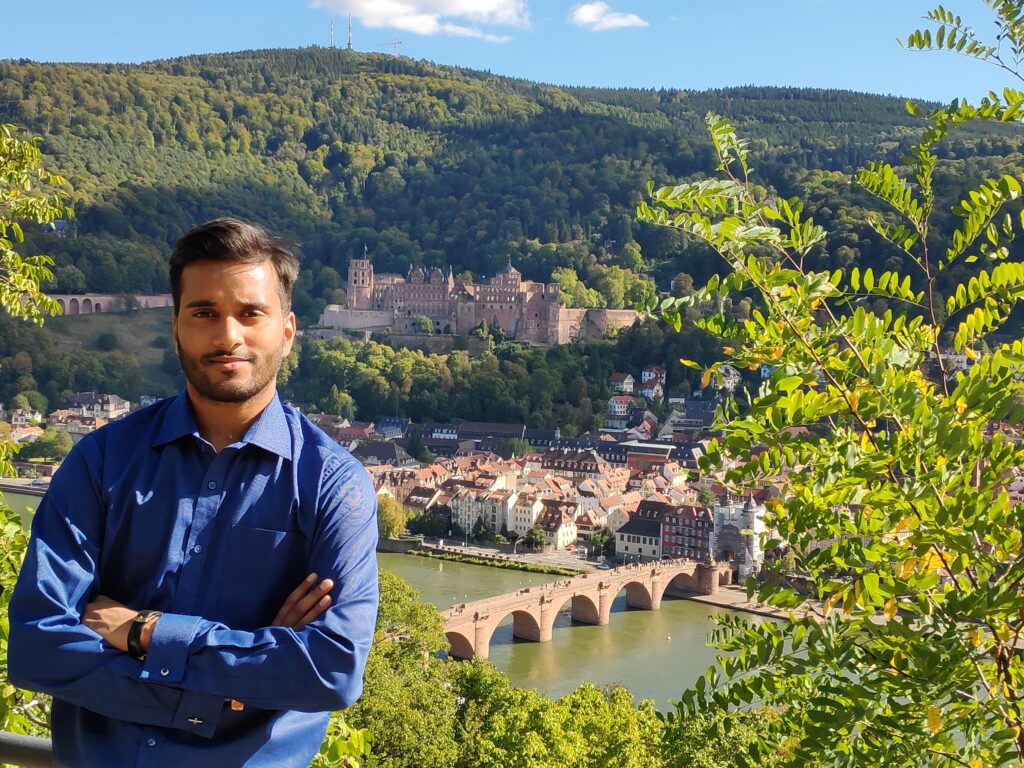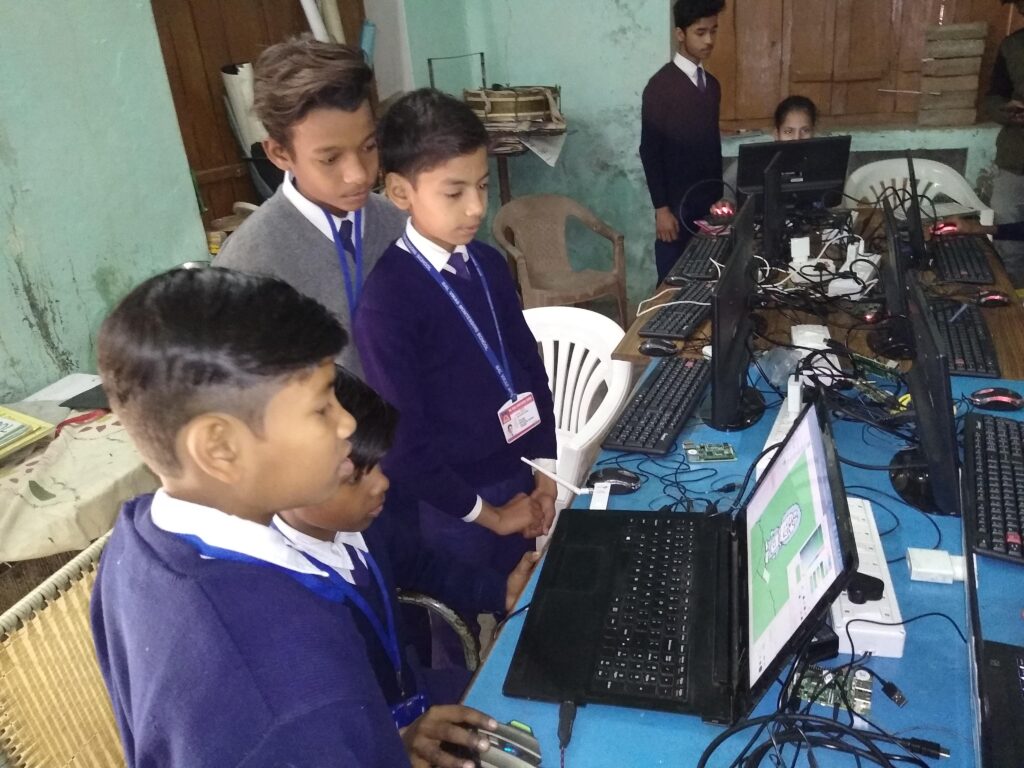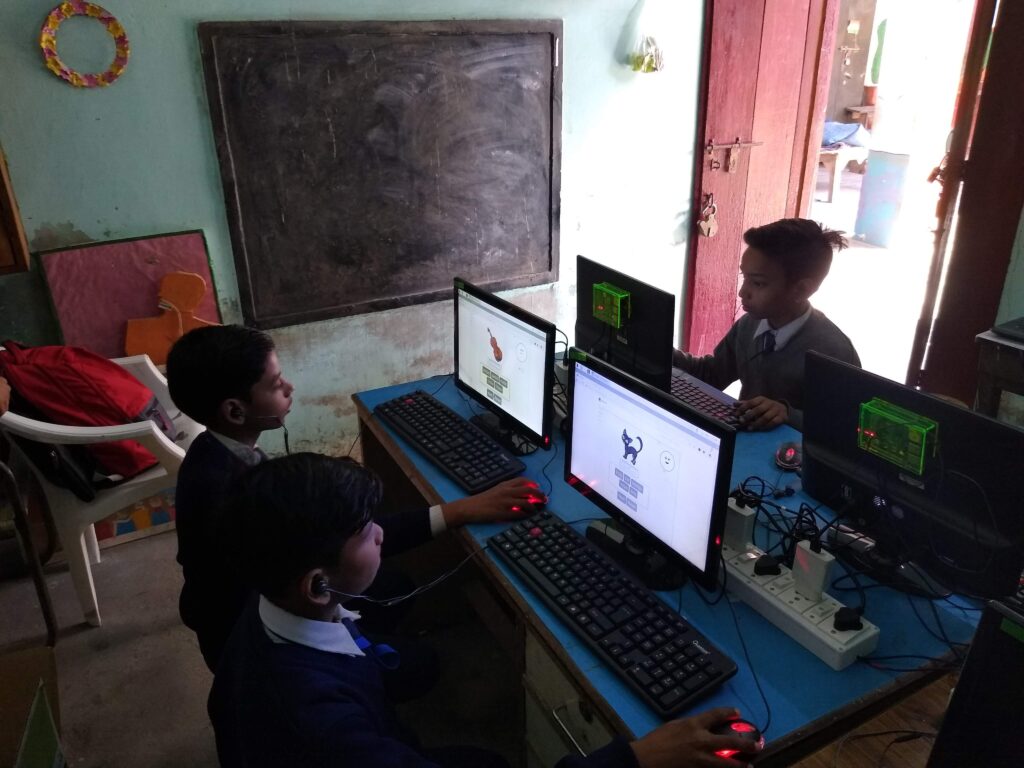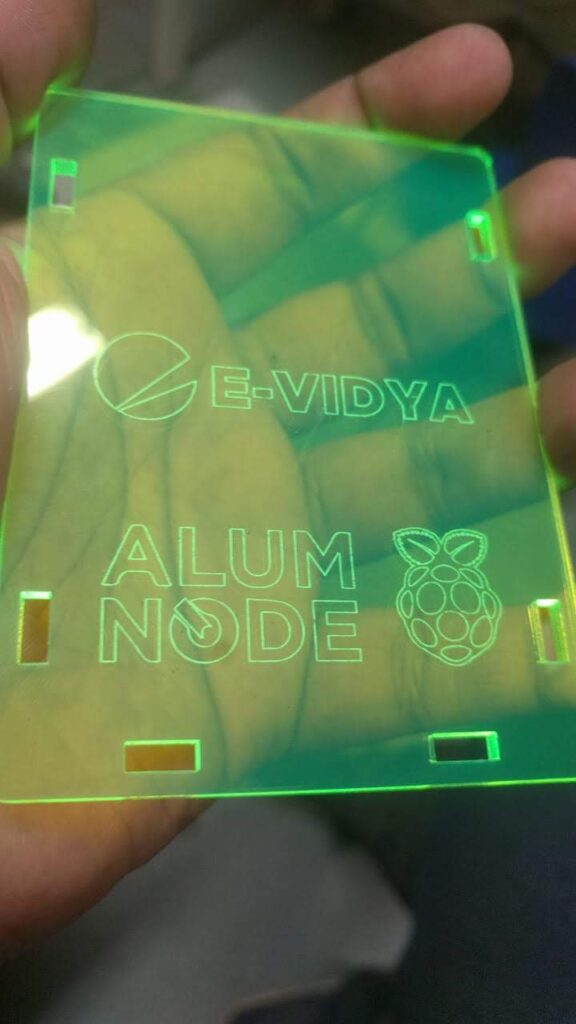HLFF Spotlight: Alumni in Action
BLOG: Heidelberg Laureate Forum

Digital Literacy and Empowerment – Pankaj Baranwal
The Heidelberg Laureate Forum has a single purpose: To provide some of the brightest minds in mathematics and computer science with the space and time to make connections and find inspiration. Some of the connections made at the HLF will echo into collaborations and projects, with some of those efforts leading to concrete developments. The HLFF Spotlight series unpacks a few of those examples.

Pankaj Baranwal in Heidelberg during the 6th HLF (2018)
When Pankaj Baranwal secured an internship at NEC Laboratories Europe in Heidelberg, his excitement could not have been greater. To make it to the start of the internship, Pankaj needed to board a flight to Europe on January 12, 2019. The only problem: It was January 2, and the German Embassy informed him it would not have an appointment available for another 4 months. Undeterred, and eager not let to the opportunity go to waste, Pankaj hatched a plan: he realized that appointments might free up when somebody cancels. However, he could not sit by his computer all day refreshing the embassy’s webpage. Instead, he wrote a short script in Python that would take a screenshot every 5 minutes and, should it reveal a free appointment, would automatically notify him and fill out the form completely. It took him only 25 minutes to code.
It is this kind of problem-solving mindset Pankaj has always applied to life, his studies, and his career, he says. It is also what led him to develop eVidya, a non-profit start-up in his home country of India that has created computer labs for students in poor and disadvantaged communities, many of whom have never used a computer before. This project helps empower young Indian students to learn how to teach themselves in order to acquire the computer literacy skills necessary to be successful in an increasingly digital world.
His journey of founding eVidya began in 2018, when Pankaj attended the 6th Heidelberg Laureate Forum in Heidelberg, Germany, which annually hosts 200 young researchers from around the world in the fields of mathematics and computer science. Here they are able to meaningfully interact, debate and exchange ideas with dozens of laureates from their fields. In our conversation with him in May 2022, Pankaj describes his experience at the 6th HLF:
That was a really life-changing event for me personally, because in India, I think most students suffer from the imposter syndrome (…) We are one in a billion. So everywhere we go, we have more people like us doing better things than us. Going to the HLF and meeting these top minds from mathematics and computer science really opened my mindset to this entirely new world of people who have done amazingly well. Tapping into that network was, I think, the biggest add-on to my life, because we had studied from books written by these people (…) so meeting them and then talking to them and finding out they are just as human as we are was a pretty intense experience.
He says that while many of the other young researchers he met at the HLF were very analytical, when he spoke to the laureates, it was on a different level entirely: “They were talking about the art, the beauty, the magic that is computer science and mathematics.” Among the people he met at the 6th HLF was Vinton Cerf, who is considered one of the fathers of the internet: “He was so down to earth and humble and so curious a person. I’ve never seen little children as curious as he is about almost every topic every student was pitching. So that was a pretty game-changing experience.”
During his time at the 6th HLF in 2018, Pankaj also met Gürkan Solmaz, senior researcher at NEC Laboratories Europe, with whom he developed the project idea for eVidya. Their project was then selected for special funding by the HLF’s alumni network “AlumNode”, a collaboration between the Heidelberg Laureate Forum Foundation (HLFF) and German Scholars Organization (GSO), funded by the Klaus Tschira Stiftung.

Students in eVidya’s pilot program at Bal Vikas Montessori School in Lucknow, India (2020)
As Pankaj tells us, part of the inspiration for his project came from his mother: “My mother runs a free-for-all community-run school in Lucknow, India. [It is in an] underrepresented, financially struggling neighborhood.” Pankaj points out that, while he was fortunate enough to attend private school himself, during sixth and seventh grade he “used to go after school or during the summer vacations to this school and teach the kids there.” Pankaj says this ‘peer-learning model’ philosophy has stuck with him even today. EVidya, he points out, was intended to utilize this philosophy, but also as a fulfillment of the ultimate promise of the internet and digitalization: “The internet was supposed to democratize schedule training, education, and everything, but I think it has actually widened the gap between our worlds.”
To get started, part of the project funding was used to purchase Raspberry Pis – cost-effective mini-computers that are popular in the maker and hacking communities for their low cost and versatility. The important thing in Pankaj’s mind was for the money to be used in the most efficient and sustainable way:
I’ve seen a lot of nonprofits who are funded from Western agencies where they get the funding, they make communities dependent on that funding, and as soon as the funding stops, the community goes back to the Dark Ages.
Part of that sustainability would come from relying on the peer-learning model:
The way we thought about it was: We are experts in our domains. We are more experienced than these guys. We will teach a batch of students there, and from every batch we teach, we will try to help two or three kids become teachers to the next batch. That is how you can actually support an entire sustainable ecosystem (…) That is how you create meaningful impact.
Pankaj designed eVidya (a portmanteau of electronic and vidya, which is “knowledge” in Hindi) with two programs in mind. The first would be a digital literacy program:
Most of these students in this community-run school had never accessed the internet, had never used a computer. They have played Candy Crush on a mobile phone. That’s about it. They know Facebook exists, they know WhatsApp exists.
Therefore, the students would first learn the basics – how keyboards and mice work, how to access email, use YouTube and so on.
The second program would be digital empowerment: “Now that you know the basics, how can you launch some more tools and technologies to solve problems in your society?” Pankaj explains how some students would help their parents selling groceries on the street out of their van. By making sure that their store was visible via Google Maps, they could help improve their parents’ sales.

Students learning digital literacy skills at a finished eVidya station, Bal Vikas Montessori School in Lucknow, India (2020)
At the heart of the endeavor was always Pankaj’s problem-solving approach: “[to teach students] how they can build their own mindset in a way that they (…) use what they are studying to solve real-world problems. Because at the end of the day, if you are not helping the community around you, what’s even the point of education?”
Ultimately, the peer-learning model worked as intended: While in the first year of the project the funding was used to set up computer labs and hire nearby college students to teach digital literacy, the more experienced batch of students would take initiative and be able to pass on their knowledge to their peers, even when those teachers were no longer available.
The pilot program for eVidya ran from February to March 2020. Shortly thereafter, the COVID-19 pandemic resulted in a full lockdown. Unable to continue as planned, Pankaj refocused his approach by partnering with the ed-tech startup Precisely, creating the digital learning tool Learnage, which utilized many of the same principles that were at the core of eVidya.
Nevertheless, amazed at the success of this exercise in self-reliance and having secured new funding, Pankaj spun eVidya itself off into two new nonprofits: “More Than Marks” would help students at the school level, while “Beyond Exams” would support college students more oriented towards preparing for a career. Both organizations, Pankaj says, have together impacted around 8,000 students in the past year and a half.
Much of his problem solving-oriented approach Pankaj attributes to his undergraduate studies at the Cluster Innovation Center at the University of New Delhi, where he says he and his fellow students were encouraged to identify problems in society and workshop concrete solutions to them over the course of the academic year.
Pankaj tells us that while speaking at a hackathon, he shared his story of writing a Python script to secure a visa appointment at the German Embassy with the audience. Many of them, he points out, were using the same tools he did, they just “didn’t know how to scale it up to a different use case (…) I feel that problem-solving attitude is still missing in most people in the world.” Sometime later, he discussed the matter with one of his friends – a travel agent – who offered to buy the piece of code from him. “It was a little on the verge of not ethical,” Pankaj explains. “It was just a project for myself and I ended it there.” Mainly, what drives Pankaj, is passion for his work: “It doesn’t matter if it is coding. It doesn’t matter if it is teaching. It doesn’t matter if I’m folding clothes or talking to people or completely out of my domain (…) If you’re not passionate in everything you do, at the end of the day, your life won’t be as colorful.”
More inspirational stories are to come in the HLFF Spotlight series, so stay tuned.



Nikolas Mariani wrote (16. Nov 2022):
> […] Pankaj Baranwal [reports, in conversation with the author] “My mother runs a free-for-all community-run school in Lucknow, India. [It is in an] underrepresented, financially struggling neighborhood.” Pankaj points out that, while he was fortunate enough to attend private school himself, during sixth and seventh grade he “used to go after school or during the summer vacations to this school and teach the kids there.” Pankaj says this ‘peer-learning model’ philosophy has stuck with him even today.
> […] he wrote a short script in Python that would take a screenshot [of the appointments website of the German Embassy in India] every 5 minutes and, should it reveal a free appointment, would automatically notify him and fill out the form completely.
> […] Sometime later, he discussed the matter with one of his friends – a travel agent – who offered to buy the piece of code from him. “It was a little on the verge of not ethical,” Pankaj explains. “It was just a project for myself and I ended it there.”
Would it fit Pankaj Baranwal’s ‘peer-learning model’ philosophy, as well as his ethics an passions, to present his Python script as an appendix to this SciLogs article, for free; and thereby, and perhaps even by entertaining comments with follow-up questions, teach (those of us SciLogs readers who’d have yet to learn Pankaj Baranwal’s specific problem solving-oriented approach and/or problem-solving attitude) ?
> […] Mainly, what drives Pankaj, is passion for his work: “It doesn’t matter if it is coding. It doesn’t matter if it is teaching. It doesn’t matter if I’m folding clothes or talking to people [whose interests lie] completely out of my domain (…) If you’re not passionate in everything you do, at the end of the day, your life won’t be as colorful.”
Hi Frank,
Thanks for your interest in my work.
I would be happy to answer any follow-up questions you may have.
Problem-solving attitude is great for living an empowered, exciting life.
As for the code, I am not sure what consequences might sharing it lead to.
I can definitely share the approach I followed to secure my VISA appointment in 2 days instead of the official wait-time of 4 months.
It’s nothing fancy – just standard 30-lines of code that anyone with some knowledge of python and its libraries (Selenium, Telegram bots, etc.) can recreate.
Pankaj Baranwal wrote (19.11.2022, 15:46 o’clock):
> Hi Frank, Thanks for your interest in my work. […]
Hi Pankaj — Thanks for your kind, rapid, and (to me anyways) utterly unexpected and, compared to the lack of any response to comments in many other HLF-SciLog artciles, exceptional reply.
> As for the code […] It’s nothing fancy – just standard 30-lines of code that anyone with some knowledge of python and its libraries (Selenium, Telegram bots, etc.) can recreate.
Well, considering roughly this much knowledge as a (however hypothetical) teaching goal:
In how many, say, 20 min lessons (plus homework, or practice tasks) would you break this down — for math-(but-nothing-fancy)-affine, Assembler-, FORTRAN-, C- and Mathematica-initiated soon-to-be-54-year-olds, like myself, with (not quite as old) Windows-Laptops, for instance ?? And/or for their 7th-grade nieces ?
I reckon: about a dozen; or about 12 parts in an equivalent series of (HLF-)SciLog articles …
> I am not sure what consequences might sharing it lead to.
To those who already have some (not entirely trivial) knowledge of python and (even) its libraries (and whichever additional prerequisits I could’t even guess yet): presumably very litte…
Others, admittedly, might learn something.
But the “(HLF-)SciLog-automated-Internet-interaction-with-python-in-twelve-easy-lessons” which I seemingly am asking for wouldn’t necessarily have to mention details of the particular problem that you managed to solve for yourself, for instance, would it?
Your enthusiasm for learning is greatly appreciated.
I actually run a non-profit – BeyondExams where one of our main goals has been to run digital literacy and digital empowerment programs for under-represented communities in tech.
Would be happy to create short video lessons for you or your niece to follow along. The aim would be to help people start translating real-world problems into coding problems that you can solve through easy python programs.
Not really worrying about the number of such blogs / video lessons required as it will take however much time and effort it takes.
I meant consequences that may be “bestowed” upon me by the Germany Embassy, if they find out. Government organisations don’t appreciate people playing around with their legacy infrastructure.
But anyway, I believe we are on the same page.
“[…] automated-Internet-interaction-with-python-in-twelve-easy-lessons” sounds like a cool project. If time allows for it and there is enough interest, I’d be happy to take it forward.
Pankaj wrote (21.11.2022, 09:50 o’clock):
> Your enthusiasm for learning is greatly appreciated.
Thank you; and thanks to Nikolas Mariani’s contribution as reporter and author of the above SciLog article (as well as thanks to unnamed providers of this opportunity).
> I actually run a non-profit – BeyondExams where […]
Impressive! Your BeyondExams organization was of course already mentioned and linked in the article. There seemed to be a suggestion that it might be restricted to (actually enrolled) college students; but — following your own recommendation — I’ll definitely take a closer look soon.
> Would be happy to create short video lessons for you or your niece to follow along.
That seems like a lot of effort and “circumstance” (on both sides);
compared to you quickly copy-n-pasting selected lines or portions of your actual python code right here in the “Comment” window.
(You could also highlight the actual code portions by enclosing them in
“<code> … </code>” tags. …)
> I meant consequences that may be “bestowed” upon me by […], if […]
If you imagine that “they” haven’t found out already at the latest from the above SciLogs article — then why keep mentioning “them” and the specific problem you were facing at all ?? All I really care for (for the time being), anyways, is to gain some more understanding of relevant python commands, and the practical issues in actually compiling python code and running the resulting executable appropriately on my (Windows 10) laptop.
> The aim would be to help people start translating real-world problems into coding problems that you can solve through easy python programs.
Well, if pressed to declare a real-world problem involving the periodic monitoring of a website, perhaps along a notification to my mobile phone, it would be related to the posting of comments on pages of this SciLog.
(And — obviousy — I hope that my rather explicit description of this real-world problem of mine, and presumably of additional commenters to that same SciLog, too, will not have immediate punitive repurcussions in form of an additional delay, or even the deliberate decline, of posting the comment I have submitted there, already, on 17.11.2022, 18:21 Uhr.)
In the meantime: thanks so much, again, for your interest and support — and not least: for your being such an inspiring example!